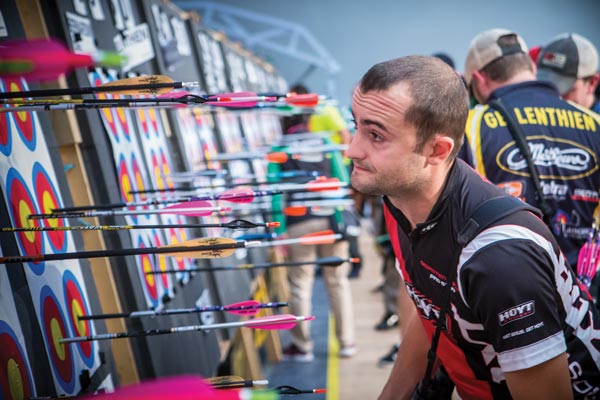Alistair Whittingham explains how to get back on track if you lose focus after a bad shot…

People will tend to have more shots in the poor category than there should be, but again this does not mean you are shooting badly
Q. I seem to get very flustered if I make bad shot – if I make a mistake on one arrow I end up losing lots more points on the next few because I can’t settle down again very quickly. Any tips on how to get my focus back?
A. There are two major areas to consider here, and the first is honesty and realism about your performance ability.
In any performance 10 per cent of what you do will be above average, 10 per cent will be below average and 80 per cent will be average – this has nothing to do with how good you are or your focus, it is just a simple truth. Firstly, you must identify your average. Too many people are trying to attain the level of performance in the top 10 percent and use this as a basis for measuring how well they are doing the task in that moment. To find your average performance is easy and useful to do in practice; simply shoot 60 shots on a target, and after each end of three arrows mark on a piece of paper if each shot was perfect, average or poor.
These are subjective measures and are unique to what your current ability level is. After 60 shots, you should have four to eight shots in each of the perfect and poor categories, and 44-52 shots in the average category. Do this a couple of times and if the numbers do not correspond to those stated then you are not measuring your performance accurately or honestly. People will tend to have more shots in the poor category than there should be, but again this does not mean you are shooting badly – it means that your expectations are too high. Your internal measure of a shot will change over time but the relative percentages will always be the same (as you get technically better you will be more critical of each shot).
Once you have an accurate measure of your ability you will, firstly, accept that poor shots happen (nobody is perfect); and, secondly, you will see that they are only a small percentage so the distraction of them to your overall performance is less. The best compound shooter in the world has said that in order to shoot 300/300 they have to get “lucky” with one bad shot – they are comfortable they can shoot 299 as their poor shots will still generally land in the 10, but one of those arrows out of the 30 will be bad enough to need to be fortunate to catch the 10 ring.
The second area to consider is a coping strategy. When an error is made, do not over-analyse it or hide from it – deal with it. After a bad shot follow these steps:
Allow your emotion out. If you are a “heart on your sleeve” sort of person you will need to let your frustration or emotion out. This is not an excuse to make a scene, swear loudly or bang your kit around, that is just embarrassing to you and distracting to others. Swear in your head, close your eyes, make a movement (not an attention-grabbing one).
Briefly analyse what you think you did wrong. This is learnt in practice and is very simple: I moved this bit, didn’t do this bit, wasn’t strong enough on the shot, and so on. Believe in this reason, and work on it in practice with your coach. Every performer has a couple of errors they make regularly – not hundreds of errors.
Remind yourself what you are going to do differently. This is based on point two above, and is learnt in practice. Remind yourself that you are quite good at what you are doing. This is one of a finite number (10 per cent) of errors you will make in this performance and the better you get at dealing with them the longer the gaps between errors will get. This means there is no reason for the next shot not to work.
Shoot the next shot. Crucially, you have dealt with this mistake simply and quickly. The whole process takes around 15 seconds and you have now “reset” yourself to make the next shot as you would expect.
This article originally appeared in the issue 123 of Bow International magazine. For more great content like this, subscribe today at our secure online store: www.myfavouritemagazines.co.uk

